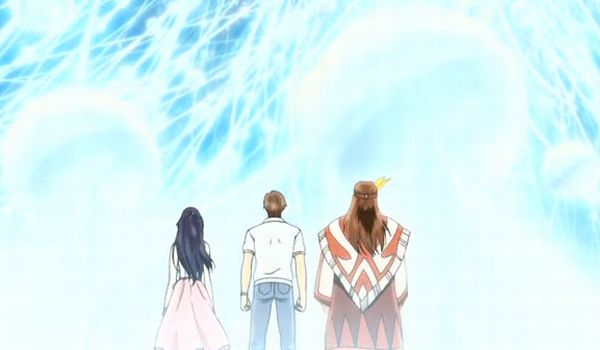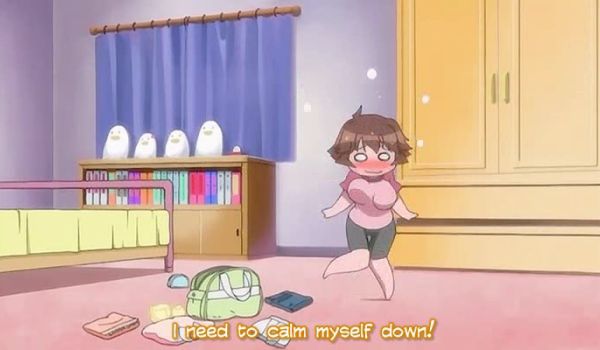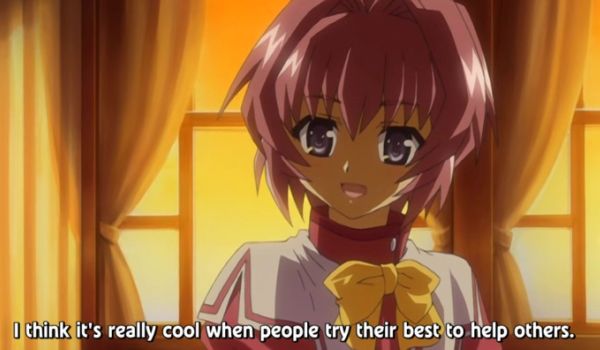What is a myth? Ideally, something that lifts you up toward the light and shows you something greater than yourself, leaving a residue of a higher world.
I’ve watched The Laws of Eternity three times over the last week or so. Â That is extremely unusual for me. Â I have mentioned this before, that I hardly ever watch a movie twice, or read a comic twice, or even a book, because I have a very strong memory for stories. Â The exception, I said, was religious or spiritual works.
It may be over the top to compare The Laws of Eternity with Holy Scripture, although I suspect the actual members of “Happy Science” probably regard the book that way. Â The movie is not the same as the book. The movie is set in the world described in the book. Or at least that is the impression I get from reading scattered pages of the book online thanks to Google Books. Â I may well order the books too, but not because I believe in them in a literal sense. Â Or at least not the story part, about the civilization on Atlantis and Mu and other continents that supposedly rose from the sea and fell back into it over the last 100 000 years.
That is not to say that it is a bad thing to take it literally. Well, it is a bad thing in that it is not true. Â But the purpose of a myth is not to be true in the scientific sense, but to be true to the soul. The myth exists in a higher world. Â Remember what I use to say here? Â “We create lower worlds, higher worlds create us.” Â And that is why I watch the movie over again, because it creates me, or recreates me, just a little. Â You may say it concentrates me, so that after watching it I find it easier to resist thoughts that are harmful and pull me towards Dissolution. Conversely, it becomes easier to think thoughts that are helpful and pull me toward the Light.
I had not expected that from an anime, to be honest. Â And after watching it, I find it hard to enjoy the other anime, even those that don’t glorify extramarital lust. Â (Japanese manga and anime have a somewhat undeserved reputation for perversity. Â Not undeserved in that the ecchi does not exist, but it is not as dominant at home as in export to the west. In Japan, there is manga for the housewife, manga for the salaryman, manga for the small kids, sports manga and educational manga. Â But many westerners want to look at the panties of high school girls, and there is manga for that too. Â But enough about that on such a beautiful day.)
Back to myth and the higher and lower worlds. This is important. There is a science that relates only to the material world, and it is a good thing for its use. Â But the human mind is free to travel to both higher and lower worlds, and indeed will do so virtually every hour of the day in normal people. Â Mostly lower worlds, again in normal people, in the form of dreams and daydreams. Â The deeper of these are the daydreams of wish fulfillment, in which the imaginary world exists to gratify and glorify the ego of the dreamer.
The myth is the opposite of this. The myth is NOT all about you. Â It is about something much greater than you, something that dwarfs you and fills you with awe. Â (If it does not, then it has to some degree failed its task as a myth.) “Myth” is not a synonym for “lie”, as it is perceived by some superficial people. Â A myth may even be literally true, but its power lies in its ability to create something in us and fill us with conviction of something higher, greater and ideally better and more noble.
Note that what is a higher world depends on your starting point! Â We all live in the same physical world, but we don’t all live in the same mental world or the same cultural world. For instance, the mythology of ancient Greek or Scandinavia may seem crude by your standards, but they may have been an ideal to reach up toward in the crude and cruel world of the Bronze and Iron ages. Â To take another example that illustrates this: The law of Moses institutes the rule “an eye for an eye” (and a life for a life). Â This is seen today as harsh, vengeful, even primitive. Â But in the culture of the Bronze Age nomads, it was a big improvement, because the rules of the blood feud was more like “a life for an eye”, since both sides considered themselves more worth than their opponents, and the conflict escalated until one side was eradicated or both were so weakened that a third faction conquered them both.
So when I refer to Happy Science movies as “myth”, it says a lot about myself. Â If I were a saint, I would be above that level, and it would be a waste of time at best. Â But despite all my accumulated knowledge, I am no saint. Â I have the wisdom of Solomon, but mostly before or after I need it. Â (I always have it when someone else needs it, of course!) I despair of ever becoming a saint (your name for this state of being may vary) without the company of saints, but saints are not only few but also have better things to do than babysit me. And even if they did, I wonder if I could tolerate it, for I love freedom and aloneness.
Anyway, myth as serial art. Â You know that there was no manga in the Bronze Age, or even a few centuries ago. Â For most of known history, even writing was rare. Â Instead we had stories. Â The bard, or just the old crone of the village, would be surrounded by people longing to hear a story. Â And then the old one would recite a story that had been told many times before, a story they knew from their own childhood, about the clever Hermes or the lovely Aphrodite or any of the thousands of other old stories. Â But then like now, there were also many coarse and dirty stories that the menfolk told each other when the children were asleep (or pretended to sleep, at least) – stories that pulled the mind down in the gutter. In that sense, not much has changed with the arrival of the printing press, and manga, and anime.
So when I talk about myth, I mean a story that is transformative, in that it lifts the human spirit up toward something greater, grander, more permanent, and hopefully more noble. The myth would ideally leave a residue of the higher world and a kind of longing for it.
The opposite could also be called transformative, I suppose, but I prefer to call it dissipative. The self is dissipated, weakened, and find it harder to tolerate reality and the challenges of life.  This, I believe, is what causes the stereotypical otaku that lives in his room and hates all things that are not part of his hobby, and who cares nothing for the feelings of others.  But  this is not something new, and certainly not Made in Japan. It is a risk we run all the time, to sink down in a darkness of our own making. We need the help we can get, to move toward the Light.  But what helps one is not always what helps another. And I am as “other” as you are ever likely to find, so I won’t say you will get anywhere by following in my footsteps.  But at least you can see them at all, in a world where most people are like shadows, just shadows in the fog.









